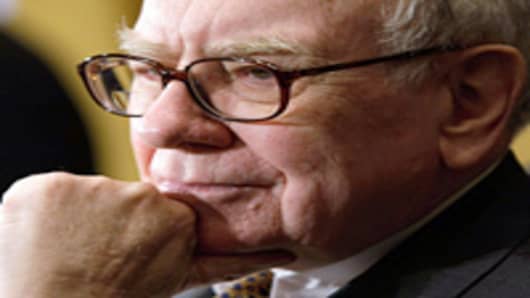Market commentators and Warren Buffett followers have been buzzing after seeing the Oracle of Omaha's op-ed piece featured in The New York Times.
Buffett's latest article, titled "Pretty Good for Government Work," defends and offers praise to the U.S. government for its efforts aimed at solving the financial crisis.
Using his classic down-home charm, Buffett structured the piece as a letter written to Uncle Sam, signed by grateful nephew, Warren.
In the piece, Buffett explains that, while "often clumsy, even inept," the government's quick thinking and actions during the chaotic closing months of 2008, while controversial, ultimately saved corporate America and U.S. citizens from tumbling in a domino-like fashion.
Specifically, he gives credit to a number of individuals who directed the efforts. Ben Bernanke, Hank Paulson, Tim Geithner, Sheila Bair and George W. Bush are all commended for their courage to take action.
The optimistic nature of Buffett's piece is not unusual. Even at the height of the global economic crisis, Buffett maintained his faith in the U.S. economy. This is highlighted in another op-ed piece penned by the investor, "Buy America. I Am."
In his now famous article, Buffett explained that the global economic turmoil was not a signal of doom and gloom, but rather a prime investing opportunity.
Putting His Money Where His Mouth Is
Putting his money where his mouth is, the investor has made a number of purchases since then, including the largest purchase in Berkshire Hathaway's history, Burlington Northern Santa Fe Railroad. This bet, Buffett explained, would benefit Berkshire Hathaway long after he was gone.
"As a result of the government's decision to step in, Buffett was able to pocket billions."
This is not the first time Buffett has offered up praise for the government's controversial decision to step in and save the financial industry either.
As he explained in this week's article and also in the past, Buffett believes that the government's decision to step in and inject hundreds of billions of dollars into the economy was necessary at the time, and saved the U.S. and the rest of the global economy from suffering a far more painful blow.
Buffett's gratitude also likely stems from his personal benefits resulting from the government's actions during those bleak times. As he highlights early on in his op-ed piece, his company was included among those dominos on the verge of falling.
Buffett's portfolio was heavily dependent on the government's decision to save the financial industry. At the time of the crisis and today, the Berkshire portfolio includes a number of financial firms. As the industry stood on the brink of collapse, holdings such as Wells Fargo, US Bancorp and American Express were seriously threatened.
Also, it is difficult to forget Buffett's bet on Goldman Sachs. Like other financial institutions, Goldman was on the verge of collapse as Buffett was stepping in. Thanks to government intervention and the shuttering of competitors, the company was able to survive and grow, earning the crown as King of Wall Street.
Buffett's first rule for investing is "don't lose money." In the event that the financial industry was allowed to crumble, Buffett's company would have likely suffered a massive loss. Instead, as a result of the government's decision to step in, Buffett was able to pocket billions.
Ultimately, it is not surprising that Buffett has good things to say for those responsible for saving the financial industry. Being a long-term investor and strong proponent of the U.S. economy, his success hinges on the nation's ability to maintain stability and work towards recovery.
While controversial, the investor believes that the actions taken were necessary to ensure this.
Counterpoint:
More on Buffett & Berkshire:
- Berkshire Hathaway Portfolio Tracker
- Buffett To Receive Presidential Medal of Freedom
- CNBC's Warren Buffett Watch Blog
______________________________
CNBC Data Pages:
______________________________
Disclosures:
In addition to writing ETF Action, Don Dion is president and founder of Dion Money Management, a fee-based investment advisory firm to affluent individuals, families and nonprofit organizations, where he is responsible for setting investment policy, creating custom portfolios and overseeing the performance of client accounts. Founded in 1996 and based in Williamstown, Mass., Dion Money Management manages assets for clients in 49 states and 11 countries. Dion is a licensed attorney in Massachusetts and Maine and has more than 25 years' experience working in the financial markets, having founded and run two publicly traded companies before establishing Dion Money Management.
Dion also is publisher of the Fidelity Independent Adviser family of newsletters, which provides to a broad range of investors his commentary on the financial markets, with a specific emphasis on mutual funds and exchange-traded funds. With more than 100,000 subscribers in the U.S. and 29 other countries, Fidelity Independent Adviser publishes six monthly newsletters and three weekly newsletters. Its flagship publication, Fidelity Independent Adviser, has been published monthly for 11 years and reaches 40,000 subscribers.
TheStreet's editorial policy prohibits staff editors, reporters and analysts from holding positions in any individual stocks.


